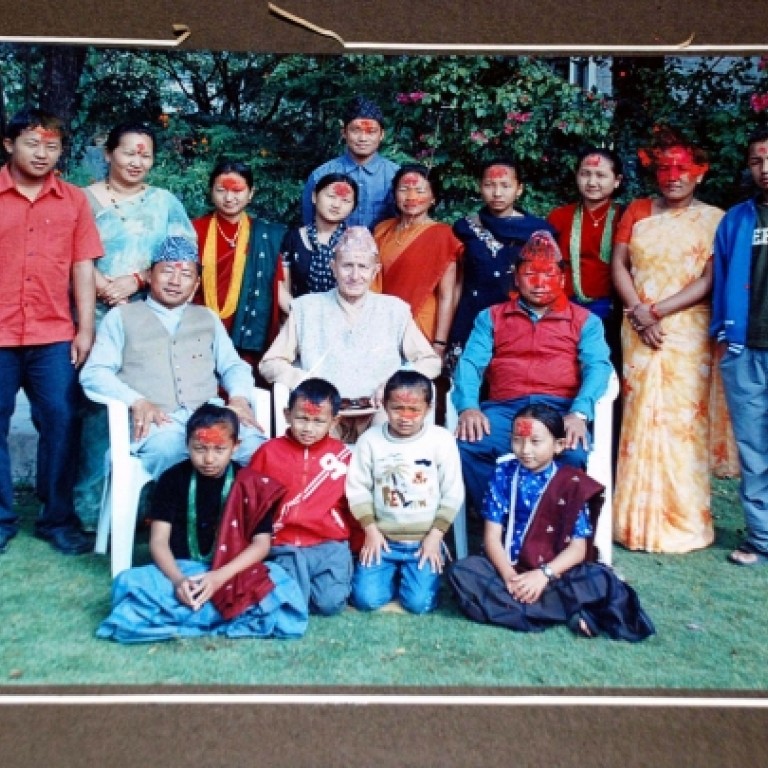
Retired British Gurkha, 88, stateless in Nepal as he waits for citizenship
Retired British colonel, 88, has adopted the 'golden' land of his fellow soldiers, but its government has not yet adopted him
While many retired Nepali Gurkha soldiers plan to move to the United Kingdom, a British veteran has adopted Nepal as his home.
But despite living in the country for more than three decades, obtaining permanent residency and giving up his British citizenship, Lieutenant Colonel John Philip Cross (Retired) said he had yet to become a Nepali national.

"It's been 11 years and two months that I've given up my British citizenship," Cross said.
At 88, he has the ability to recall date and time in history with precision. Flipping a folder of official documents clipped with photocopies he submitted to Nepal's Home Ministry, he added: "It's been 10½ years. I haven't heard a yes or a no. As of now, I'm stateless."
The permanent residency allows him to stay in Nepal and permitted him to buy land and build a house. However, he cannot leave the country, since he has no passport.
Since he secured a royal seal of approval from then-king Birendra in 1985, Cross has settled in the western city of Pokhara, where he worked as a British Gurkha recruitment officer from 1976 to 1982.
It is here that he employed 19-year-old Buddhiman Gurung as a helper. They later forged a father-son relationship.
It has been 34 years since Cross, a lifelong bachelor, became the head of the Gurung household - he is a father, father-in-law and also a grandfather. But the octogenarian's association with Nepalis dates back to 1944, when he was commissioned into the British Army's Indian Military Academy in the city of Dehra Dun to serve with the 1st Gurkha Rifles.
The following year, he joined the British Army Gurkhas in Burma, where he saw the tail end of the second world war. He was posted as an instructor from 1948 to 1959 at the Army School of Education (Gurkhas) in Malaya.
But it was during the early 1960s while fighting in northern Malaya to stop the Chinese infiltrating from Thailand to capture Kuala Lumpur that he realised the gallantry of the Gurkhas.
"With 10 men [Gurkhas], 1kg of ration for every five days and carrying 128 pounds [58kg] every day for 52 days, we fought. We took out 10 leeches from our ankle every hour."
Cross referred to his troops' success and their survival as an "epiphany" and that "some superpower had shown what [the Gurkhas] could do".
His war diaries and the heroism of Gurkha soldiers have been the subject of many books that Cross has authored. Thus he is very defensive about the Gurkhas, especially about their "mercenary" status.
"'Mercenary' is a very weasel word," he said, pointing out a paragraph from his 1996 book where he has detailed why the word should never be used. "They were always a part and parcel of the regular British Army. They are the cream of the cream."
After spending about three years with the Nepali soldiers, it was in 1947 that Cross first travelled to the Gurkhas' land. Based in India then, he said it took him seven days to travel from the Afghan border to the Nepalese capital, Kathmandu.
"Wonderful," he said about his first impression of the country that he had heard so much about. "Nepal was gold, India was bronze."
In the years that followed, Cross made himself well acquainted with the country. During his frequent visits, he started walking across Nepal and started making friends. By 1982, he had walked 16,000 kilometres, covering 65 of the Himalayan nation's 75 districts.
At 88, he still cannot get rid of his habit: the fragile-looking but fit ex-army man who uses a cane to walk around his house wakes up at 4am and walks for 12 to 16 kilometres every day.
In his neighbourhood and community, Colonel Cross, as he is known, comes across as a recognised and respected figure with a great sense of humour. He speaks Nepali with flair and fluency, seldom switching to English, and most of the time wears the traditional Nepalese topi, or hat.
During his 37 years in Nepal, he has rarely visited his birth country. And since he gave up his citizenship in 2002, he has not travelled outside Nepal because he does not have a nationality.
In his seven-page curriculum vitae, which looks like pages out of a history book, his nationality is marked as "nil: originally British, not yet Nepali".
But in 2015, he said, he wants to travel to India to attend the celebration of the 200 years of British Gurkhas. And he does not want to take any chances.
"The Indian government might give me a permit," he said. "But what if they [Nepalese Immigration] don't allow me back in Nepal?"
He added: "For now, all I can do is pray."

